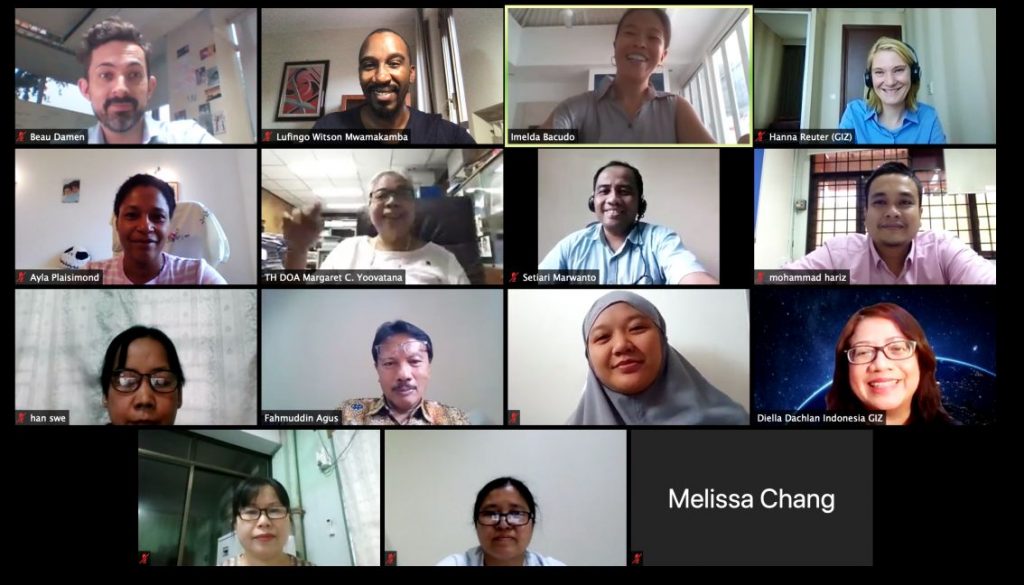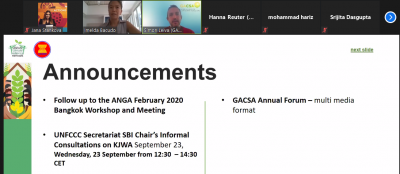The ASEAN-CRN national focal points and partners attended the network’s third virtual meeting, divided in two parts on the 11th and 23rd of September 2020, forging on collaborative and meaningful action in the land use sectors contributing towards food security and food system resiliency. The meeting was part of the network’s planned series of virtual meetings aptly themed, “ASEAN-CRN in the time of Corona”, addressing the challenges posed by the Coronavirus Pandemic.

The meeting’s main agenda on the 11th September was to introduce and discuss key principles for sustainable and circular bioeconomy by the Food and Agriculture Organization (FAO) Bioeconomy Programme and how this concept can support the ASEAN Ministers on Agriculture and Forestry (AMAF) vision of food security, climate resilience and green recovery during these times. The second part of the ASEAN-CRN meeting took place on the 23rd September and was dedicated to discussing internal issues of the network. Thailand as Chair of ASEAN-CRN hosted both meetings. A total of 24 participants attended both parts of the meeting. The participants consisted of representatives from ASEAN Member States (AMS), the ASEAN Secretariat and partner organizations.
Sustainable and Circular Bioeconomy Towards Food Systems Resilience
Ms. Anne Bogdanski, Sustainable and Circular Bioeconomy programme coordinator from the FAO in Rome led the discussion on bioeconomy and its role in contributing towards food system resilience.
The FAO Circular Bioeconomy Programme manages the International Sustainable Bioeconomy Working Group, which is composed of over 35 different institutions including policymakers, private sector actors, NGOs, civil society and scientists, and promotes knowledge exchange and provides advise to FAO on the development of sustainable and circular bioeconomy guiding documents.
Ms. Bogdanski explained that the world is currently facing a triple crisis; the COVID19 Pandemic, Climate Change, and Air Pollution and that these crises are mutually reinforcing. The pandemic has amplified the need for a resilient food system that can ensure stable access to a sufficient supply of safe, nutritious and affordable food.
A Green Recovery is seen as the solution to these crises. In the food and agriculture sector this would need to be built on three pillars; economic recovery, increased resilience, and the mitigation of health risks. A sustainable and circular bioeconomy can and should contribute to these goals as it allows for a transition to sustainable food systems. It still provides a largely untapped potential for farmers and also a huge economic opportunity.
The presentation cited bioeconomy projects and strategies implemented in Asia, including strategies in the ASEAN region from Thailand and Malaysia, as well as projects from Indonesia, Vietnam and the Philippines.
Circular Bioeconomy for Food Systems Transformation
The International Sustainable Bioeconomy Working Group also extended an invitation to representatives from Ministries to a closed webinar series they are hosting with the FAO on Circular Bioeconomy. It is an excellent opportunity for knowledge-exchange and engagement with other scientific staff from Ministries on the potential solutions made possible through circular and sustainable bioeconomy. Thailand and Malaysia already are already members of the ISBWG and several AMS representatives have expressed interest in participating. Furthermore, they pointed to the Global Bioeconomy Summit, 16-20 November 2020 in Berlin.
FAO Bioeconomy Team provides technical support to member countries on sustainable and circular bioeconomy. FAO´s work on Bioeconomy is funded by the German Ministry of Food and Agriculture (BMEL).
ASEAN-CRN Updates
The agenda of the meeting on 23rd September 2020 was for AMS focal points and partner organizations to provide and updates and have a discussion on the sustainability of ASEAN-CRN support. After a first reflection about challenges and options on this matter, the participants decided to further coordinate internally to create a common understanding on the way forward before potentially communicating recommendations to the ASEAN Working Group on Agricultural Research and Development (ATWGARD).For meeting summary, please visit The Third ASEAN-CRN Virtual Meeting, 11th and 23rd September 2020).
The meeting was jointly organized with the support from the project Climate-Smart Land Use (CSLU) in ASEAN, funded by the German Federal Ministry for Economic Cooperation and Development, Deutsche Gesellschaft für Internationale Zusammenarbeit (GIZ) and the Food and Agriculture Organization of the United Nations Office for Asia and the Pacific (FAO-ROAP). The Global Alliance on Climate Smart Agriculture (GACSA) provided communication support for the meeting.

For meeting summary on ASEAN-CRN Virtual meeting series, please visit this link
Relevant information:
The ASEAN-CRN in the time of Corona – Virtual Meeting
Stay Up to Date: ASEAN-CRN Monthly Virtual Meeting Series
Topics of ASEAN-CRN Virtual Series
FAO Bioeconomy programme
The Committee on World Food Security (CFS)
The International Conference “Adapting Land Management to Climate Change and Combating Land Degradation to Increase Resilience of Agricultural Systems”
The AgriFood Innovation Webinar Series